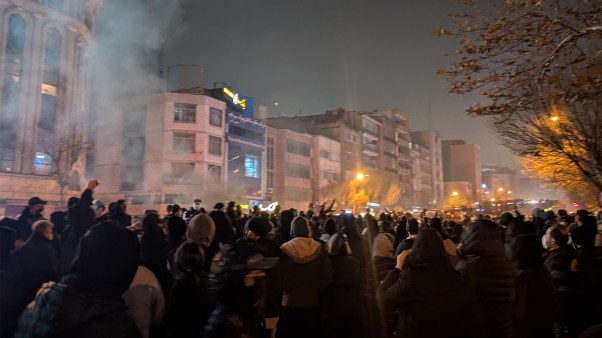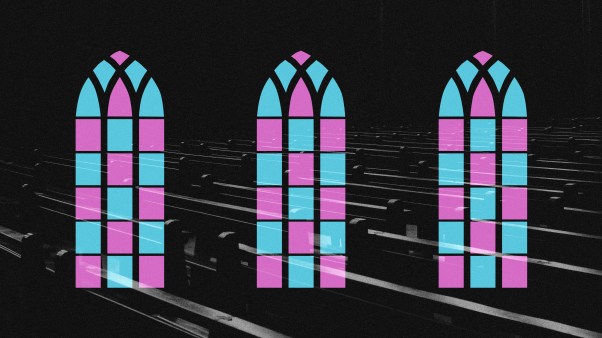The other night I attended a book-launch event for a buzzy new title. As I sat on a fold-down chair in the stands, I felt my mind wander as the president of the sponsoring organization introduced a dean at the university hosting the event, who in turn introduced yet another dignitary, who at last introduced the authors I’d paid $70 to squint at from 500 feet away.
I try to appreciate formal displays of gratitude, and I’ve come to expect pomp and circumstance at highfalutin events. Showing off your friends is a way to show off your influence.
But I’m troubled by how often I see this kind of thing transpire at Christian gatherings, specifically when it comes to public prayer—before services, Bible studies, congregational meetings, potlucks, missionary sendoffs, or blessings of new ministries.
It happens when leaders extend public invitations to pray. More often than not, the most “qualified” person in the room turns directly to the other most “qualified” person in the room.
Qualified can mean “most spiritual,” and the honor goes to other pastors, worship leaders, or small group heads (in that order). Other times, qualified is synonymous with “upstanding family men,” who are almost always both husbands and dads.
It’s rare, at least in my experience, for a leader to hand the microphone to someone without any title, seminary degree, or personal connection.
There might be good reason for that. Public prayer overlaps with public speaking. Whether by standing in front of a congregation or holding hands at a dinner table, talking to God out loud sets a tone and reiterates theological convictions. Pastors may not want to put someone on the spot—or they might be nervous about what that someone might say.
But when it’s clear that official leaders only trust official leaders to pray for a community, that runs the risk of communicating a value judgment: that the people whose prayers are worthy of being heard aloud must be carefully vetted and possess authority.
Unfortunately, our judgment of who’s worthy often tangles with God’s judgment. The prophet Samuel set his eyes on David’s seven brothers before he realized who God had selected as the future king.
This is not an appeal to relax character standards for Christian leaders. It’s a reminder of our own tendency to have a much narrower view than God does of who he can use. By being intentionally diverse—and thoughtfully “subversive”—in who we ask to pray in public, we help remind others to see people’s potential with God’s eyes.
This kind of inclusivity might make public prayer less of a pious performance, because “regular Christians” don’t have the same burden to prove their pastoral qualifications. Performing is a learned skill, but prayer is not. In one parable, Jesus extols the tax collector who notably would not look to heaven “but beat his breast and said, ‘God, have mercy on me, a sinner.’” That tax collector—not the self-satisfied Pharisee praying at the temple—would go home justified (Luke 18:9–14).
More democratic prayer might also offer a window into the challenges and joys affecting a wider variety of individuals and communities—challenges and joys which may or may not match up with what leaders understand their congregants’ priorities to be.
Theological truths and the unchanging attributes of God resonate with each of us differently. Hearing more people proclaim the particular truths that are viscerally affecting them offers an opportunity for both familiar reminders and new insights.
I was reminded of this while reading a recent essay from a prison chaplain. She recounts inviting a man with burns so severe the guards snidely called him Deadpool to pray for his fellow inmates at the end of a service. The prisoner’s words stunned the room—and left him glowing.
Of course, many people in our congregations who we might ask to pray are shy, or uncertain, or don’t speak the dominant language fluently enough to be confident in their ability. A sporadic invitation to a “regular” Christian might just put pressure on them to master the Christianese of the credentialed believer.
The answer here is prewritten prayers: prayers penned by saints of yesteryear, prayers from contemporary theologians, prayers that are simply passages of Scripture.
I grew up with exclusively extemporaneous prayer, and I used to think written prayers were less genuine—that is, until I realized that written prayers often allow for the formation of a more focused, complete idea. (The Prayer of Saint Francis convicts me each time I read it.)
More importantly, when we need someone to pray over a child before dedication or a Christian before baptism, written prayers help fight the very tendencies that Jesus rebukes when he tells us to talk to God in our rooms, behind closed doors, rather than in synagogues and on street corners (Matthew 6:5–8). At its best, extemporaneous prayer allows a speaker to address the needs and emotions of particular people. But praying off-the-cuff also allows the speakers to make it more about themselves—droning on out of anxiety, quoting Scripture to show off their Bible fluency, raising their voices to heighten the drama and get a reaction.
Scripted prayers, meanwhile, decenter a speaker. They’re more accessible to new believers and second-language learners. They act as a safeguard, preventing any of us from blurting out erroneous theology. It’s all too easy to inadvertently preach the prosperity gospel: We know, God, that this church has been faithful, and because of our faithfulness, you’ve blessed us with a big tithe today and this great meal.
In every church, who prays in public should not depend on gender, title, position, length of time as a Christian, education level, or perceived spiritual depth—because prayer is open to anyone who wants to connect with God. Certainly, leaders pray. But so do the poor, the sinful, the helpless, and the broken.
And hearing even prewritten words in an unfamiliar voice—the shaky voice of a new convert, the surprising timbre from the person who always sits in the back, the oscillating pitch of a teenager—matters. It symbolizes that the church is a different kind of place, in which God uses “the foolish things of the world to shame the wise” (1 Cor. 1:27), establishing a kingdom that doesn’t abide by traditional hierarchies.
Public prayers are opportunities for us to hear the cries of the Christians we are in community with, to demonstrate a different way of doing things. Let’s not squander that.
Morgan Lee is the global managing editor at Christianity Today.














